配套2015-16中学教材全解工具版九年级英语
- 格式:doc
- 大小:91.00 KB
- 文档页数:8
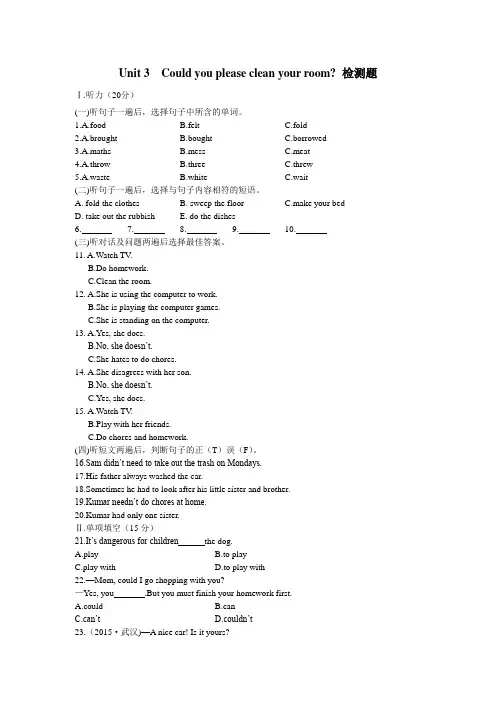
Unit 3 Could you please clean your room? 检测题Ⅰ.听力(20分)(一)听句子一遍后,选择句子中所含的单词。
1.A.food B.felt C.fold2.A.brought B.bought C.borrowed3.A.maths B.mess C.meat4.A.throw B.three C.threw5.A.waste B.white C.wait(二)听句子一遍后,选择与句子内容相符的短语。
A. fold the clothesB. sweep the floorC.make your bedD. take out the rubbishE. do the dishes6. 7. 8. 9. 10.(三)听对话及问题两遍后选择最佳答案。
11. A.Watch TV.B.Do homework.C.Clean the room.12. A.She is using the computer to work.B.She is playing the computer games.C.She is standing on the computer.13. A.Yes, she does.B.No, she doesn’t.C.She hates to do chores.14. A.She disagrees with her son.B.No, she doesn’t.C.Yes, she does.15. A.Watch TV.B.Play with her friends.C.Do chores and homework.(四)听短文两遍后,判断句子的正(T)误(F)。
16.Sam didn’t need to take out the trash on Mondays.17.His father always washed the car.18.Sometimes he had to look after his little sister and brother.19.Kumar needn’t do chores at home.20.Kumar had only one sister.Ⅱ.单项填空(15分)21.It’s dangerous for children the dog.A.playB.to playC.play withD.to play with22.—Mom, could I go shopping with you?—Yes, you .But you must finish your homework first.A.couldB.canC.can’tD.couldn’t23.(2015·武汉)—A nice car! Is it yours?—No, it isn’t. I it from a friend of mine two days ago.A.borrowB.have borrowedC.will borrowD.borrowed24.—Could I please your watch?—Sorry. It doesn’t work.eB.to useinged25.—Could you please take out the trash?—.A.Not at allB.You’re welcomeC.No wayD.No problem26.He didn’t finish the room.A.cleanB.cleanedC.cleaningD.cleans27.He is to finish the difficult work.A.enough confidentB.confident enoughC.enough confidenceD.confidence enough28.His father wants him in Beijing.A.to workB.worksC.workD.working29.Students have homework to do every day.A.so manyB.such manyC.such muchD.so much30.I never go to school late; .A.so does TomB.neither does TomC.so Tom doesD.neither Tom does31.(2015·山东潍坊)Next month we’re going somewhere interesting as soon as the holiday .A.will beginB.has begunC.beginsD.is beginning32.You could a bike from your friend.A.lendB.giveC.buyD.borrow33.Too much noise makes me uncomfortable.A.feelingB.feelC.feltD.to feel34.(2015·乌鲁木齐)—Where is Tom?—He is practicing English he can win the speech competition.A.to speak;in order toB.speaking;so thatC.speaking;in order toD.to speak;so that35.He doesn’t like playing cards; he thinks playing cards is a waste time.A.ofB.atC.forD.inⅢ.完形填空(15分)Tina and Tara are twin sisters. They look 36 , 37 they also have some differences.One day their grandfather came to see them with two gifts(礼物).When he came into the house, he saw Tina and 38 her a gift. After a while, when he got into the garden, he saw 39 granddaughter “Tara”.In fact that was Tina. When he gave the other gift to her, she said, “You gave me one just now.” “No, I gave a gift to your sister Tina.” “Oh, grandfather, I’m Tina.” Just then Tara came into the garden, 40 .“No w, grandfather, can you tell the differences 41 us?” “No, I can’t. Can you42 me?” “Yes, look. Tara is a little43 than me. Her hair is longer and curlier than 44 .Now, grandfather, can you see?” “Yes, now I can tell you from Tara. Tara, here is th e gift for you.” “Thank you45 your gift, grandfather.” With these words, they all laughed happily.36.A.same B.the same C.different D.differences37.A.and B.so C.but D.because38.A.gave B.took C.brought D.got39.A.others B.another C.the other D.the others40.A.either B.so C.also D.too41.A.as B.between C.from D.with42.A.tell B.say C.talk D.ask43.A.tall B.taller C.tallest D.the tallest44.A.I B.me C.my D.mine45.A.with B.of C.for D.toⅣ.任务型阅读(10分)Johnson lived in a certain part of London.Every morning,he woke up early and took an old bag to the subway station.He would take the subway to Central London.There he would collect scrap(废品).He did this every single day.Johnson collected scrap for 20 years.His house was dirty,and a bad smell came out of the house.The neighbors could not stand the smell anymore,so they called the police officers to deal with the problem.The officers opened the door and cleared the house.They found some money in his house.The police soon knew that Johnson was not a truly poor man because he could live a normal life with the money.They decided to try to stop him collecting scrap.In the evening,the police found Johnson near his house.One of the officers told him that there was no need for him to collect scrap anymore.Johnson went back to his house without saying anything.The next morning he woke up as usual and continued collecting scrap.A couple of days later,the police knew that Johnson had to send much money to his old parents.They were badly ill for many years in a small village.Although they could get relief (救济金) from the government,Johnson refused.He believed he could make money by his own hands.After knowing the truth,the officers announced the fact to the neighbors.All of them understood and admired Johnson.Johnson had no great plans or dreams all his life.He won praise from others because he kept independence in his mind.The earlier people learn to be independent,the more meaningful life they will get.根据短文内容,回答下列问题。
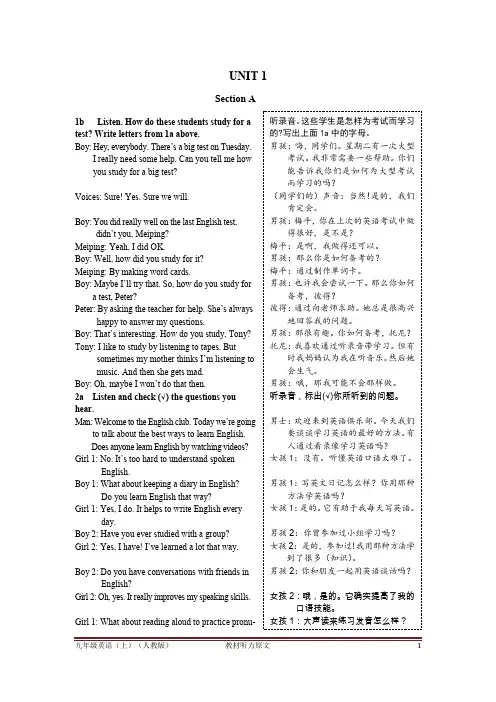
UNIT 1 Section A1b Listen. How do these students study for a test? Write letters from 1a above.Boy: Hey, everybody. There’s a big test on Tuesday.I really need some help. Can you tell me howyou study for a big test?Voices: Sure! Yes. Sure we will.Boy: You did really well on the last English test, didn’t you, Meiping?Meiping: Yeah, I did OK.Boy: Well, how did you study for it?Meiping: By making word cards.Boy: Maybe I’ll try that. So, how do you study fora test, Peter?Peter: By asking the teacher for help. She’s always happy to answer my questions.Boy: That’s interesting. How do you study, Tony? Tony: I like to study by listening to tapes. But sometimes my mother thinks I’m listening tomusic. And then she gets mad.Boy: Oh, maybe I won’t do that then.2a Listen and check (√) the questions you hear.Man: Welcome to the English club. Today we’re going to talk about the best ways to learn English.Does anyone learn English by watching videos? Girl 1: No. It’s too hard to understand spokenEnglish.Boy 1: What about keeping a diary in English?Do you learn English that way?Girl 1: Yes, I do. It helps to write English every day.Boy 2: Have you ever studied with a group?Girl 2: Yes, I have! I’ve learned a lot that way.Boy 2: Do you have conversations with friends in English?Girl 2: Oh, yes. It really improves my speaking skills. Girl 1: What about reading aloud to practice pronu- 听录音。
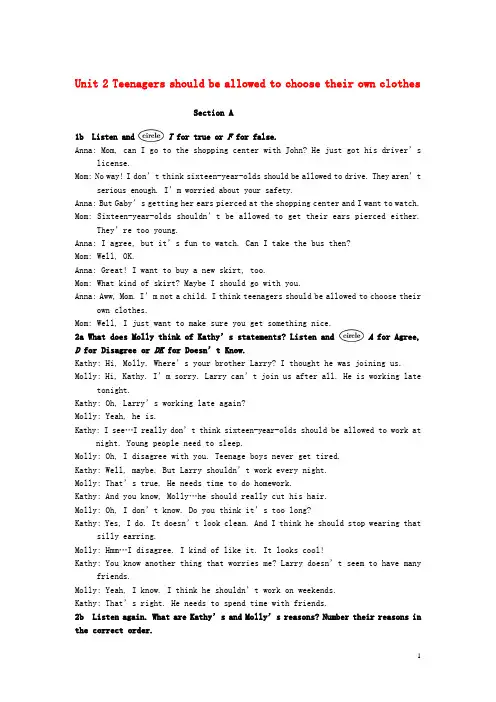
Unit 2 Teenagers should be allowed to choose their own clothes Section A1b Listen and T for true or F for false.Anna: Mom, can I go to the shopping center with John? He just got his driver’s license.Mom: No way! I don’t thin k sixteen-year-olds should be allowed to drive. They aren’t serious enough. I’m worried about your safety.A nna: But Gaby’s getting her ears pierced at the shopping center and I want to watch. Mom: Sixteen-year-olds shouldn’t be allowed to get their ears pierced either.They’re too young.Anna: I agree, but it’s fun to watch. Can I take the bus then?Mom: Well, OK.Anna: Great! I want to buy a new skirt, too.Mom: What kind of skirt? Maybe I should go with you.Anna: Aww, Mom. I’m not a child. I think teenagers should be allowed to choose their own clothes.Mom: Well, I just want to make sure you get something nice.2a What does Molly think of Kathy’s statements? Listen and A for Agree, D for Disagree or DK for Doesn’t Know.Kathy: Hi, Molly. Where’s your brother Larry? I thought he was joining us. Molly: Hi, Kathy. I’m sorry. Larry can’t join us after all. He is working late tonight.Kathy: Oh, Larry’s working late again?Molly: Yeah, he is.Kathy: I see…I really don’t think sixteen-year-olds should be allowed to work at night. Young people need to sleep.Molly: Oh, I disagree with you. Teenage boys never get tired.Kathy: Well, maybe. But Larry shouldn’t work every night.Molly: That’s true. He needs time to do homework.Kathy: And you know, Molly…he should really cut his hair.Molly: Oh, I don’t know. Do you think it’s too long?Kathy: Yes, I do. It doesn’t look clean. And I think he should stop wearing that silly earring.Molly: Hmm…I disagree. I kind of like it. It looks cool!Kathy: You know another thing that worries me? Larry doesn’t seem to have many friends.Molly: Yeah, I know. I think he shouldn’t work on weekends.Kathy: That’s right. He needs to spend time with friends.2b Listen again. What are Kathy’s and Molly’s reasons? Number their reasons in the correct order.Kathy: Hi, Molly. Where’s your brother Larry? I thought he was joining us. Molly: Hi, Kathy. I’m sorry. Larry can’t join us after all. He is working late tonight.Kathy: Oh, Larry’s working late again?Molly: Yeah, he is.Kathy: I see…I really don’t think sixteen-year-olds should be allowed to work at night. Young people need to sleep.Molly: Oh, I disagree with you. Teenage boys never get tired.Kathy: Well, maybe. But Larry shouldn’t work every night.Molly: That’s true. He needs tim e to do homework.Kathy: And you know, Molly…he should really cut his hair.Molly: Oh, I don’t know. Do you think it’s too long?Kathy: Yes, I do. It doesn’t look clean. And I think he should stop wearing that silly earring.Molly: Hmm…I disagree. I kind o f like it. It looks cool!Kathy: You know another thing that worries me? Larry doesn’t seem to have many friends.Molly: Yeah, I know. I think he shouldn’t work on weekends.K athy: That’s right. He needs to spend time with friends.Section B1c Listen and the things in 1a that Peter talks about.Dad: What’s the matter, Peter?Peter: I think I’m going to fa il a math test, Dad.Dad: You are? Why?Peter: Well, I missed the bus and I had to walk to school.Dad: So?Peter: I’m not allowed to get to class late, and there was a big test today. Dad: And you weren’t allowed to take the test?Peter: That’s right. But I know I could pass that test.Dad: Well, Peter, the school has to have rules, you know.Peter: I know. But they should let me take the test later. It’s not fair if they don’t even give me a chance!Dad: Well, you might still be allowed. Maybe you could talk to the teacher after school.Peter: Yeah. Maybe if I explain what happened, she’ll understand.1d Listen again. Match these sentence parts.Dad: What’s the matter, Peter?Peter: I think I’m going to fa il a math test, Dad.Dad: You are? Why?Peter: Well, I missed the bus and I had to walk to school.Dad: So?Peter: I’m not allowed to get to class late, and there was a big test today.Dad: And you weren’t allowed to take the test?Peter: That’s right. But I know I could pass that test.Dad: Well, Peter, the school has to have rules, you know.Peter: I know. But they should let me take the test later. It’s not fair if t hey don’t even give me a chance!Dad: Well, you might still be allowed. Maybe you could talk to the teacher after school.Peter: Yeah. Maybe if I explain what happened, she’ll understand.。
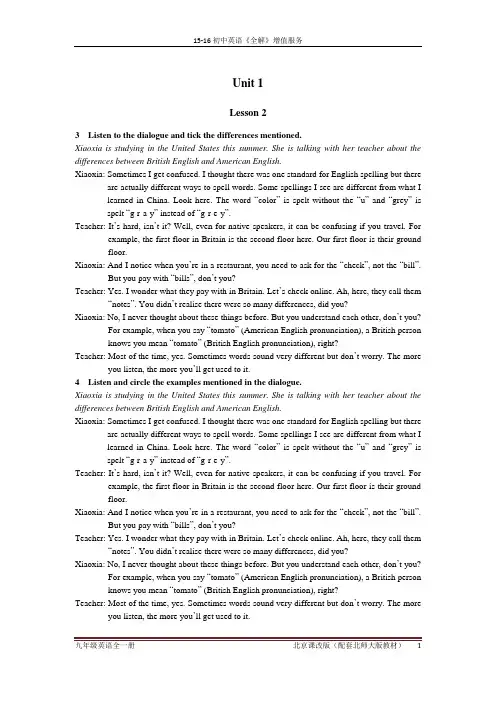
Unit 1Lesson 23Listen to the dialogue and tick the differences mentioned.Xiaoxia is studying in the United States this summer. She is talking with her teacher about the differences between British English and American English.Xiaoxia: Sometimes I get confused. I thought there was one standard for English spelling but there are actually different ways to spell words. Some spellings I see are different from what I learned in China. Look here. The word “color”is spelt without the “u”and “grey”is spelt “g-r-a-y” instead of “g-r-e-y”.Teacher: It’s hard, isn’t it? Well, even for native speakers, it can be confusing if you travel. For example, the first floor in Britain is the second floor here. Our first floor is their ground floor.Xiaoxia: And I notice when you’re in a restaurant, you need to ask for the “check”, not the “bill”.But you pay with “bills”, don’t you?Teacher: Yes. I wonder what they pay with in Britain. Let’s check online. Ah, here, they call them “notes”. You didn’t realise there were so many differences, did you?Xiaoxia: No, I never thought about these things before. But you understand each other, don’t you?For example, when you say “tomato” (American English pronunciation), a British person knows you mean “tomato” (British English pronunciation), right?Teacher: Most of the time, yes. Sometimes words sound very different but don’t worry. The more you listen, the more you’ll get used to it.4Listen and circle the examples mentioned in the dialogue.Xiaoxia is studying in the United States this summer. She is talking with her teacher about the differences between British English and American English.Xiaoxia: Sometimes I get confused. I thought there was one standard for English spelling but there are actually different ways to spell words. Some spellings I see are different from what I learned in China. Look here. The word “color”is spelt without the “u”and “grey”is spelt “g-r-a-y” instead of “g-r-e-y”.Teacher: It’s hard, isn’t it? Well, even for native speakers, it can be confusing if you travel. For example, the first floor in Britain is the second floor here. Our first floor is their ground floor.Xiaoxia: And I notice when you’re in a restaurant, you need to ask for the “check”, not the “bill”.But you pay with “bills”, don’t you?Teacher: Yes. I wonder what they pay with in Britain. Let’s check online. Ah, here, they call them “notes”. You didn’t realise there were so many differences, did you?Xiaoxia: No, I never thought about these things before. But you understand each other, don’t you?For example, when you say “tomato” (American English pronunciation), a British person knows you mean “tomato” (British English pronunciation), right?Teacher: Most of the time, yes. Sometimes words sound very different but don’t worry. The more you listen, the more you’ll get used to it.5Listen again and write the examples in the correct box below.Xiaoxia is studying in the United States this summer. She is talking with her teacher about the differences between British English and American English.Xiaoxia: Sometimes I get confused. I thought there was one standard for English spelling but there are actually different ways to spell words. Some spellings I see are different from what I learned in China. Look here. The word “color”is spelt without the “u”and “grey”is spelt “g-r-a-y” instead of “g-r-e-y”.Teacher: It’s hard, isn’t it? Well, even for native speakers, it can be confusing if you travel. For example, the first floor in Britain is the second floor here. Our first floor is their ground floor.Xiaoxia: And I notice when you’re in a restaurant, you need to ask for the “check”, not the “bill”.But you pay with “bills”, don’t you?Teacher: Yes. I wonder what they pay with in Britain. Let’s check online. Ah, here, they call them “notes”. You didn’t realise there were so many differences, did you?Xiaoxia: No, I never thought about these things before. But you understand each other, don’t you?For example, when you say “tomato” (American English pronunciation), a British person knows you mean “tomato” (British English pronunciation), right?Teacher: Most of the time, yes. Sometimes words sound very different but don’t worry. The more you listen, the more you’ll get used to it.Unit 2Lesson 53Listen to the interview. Tick the quotations that are mentioned.Host: Hello everyone. I’m your host David Newton and welcome to “The Book Club”. Today we’re going to discuss how important reading is. Our guests today are well-known writer Sandra White and English teacher Dr Peter Johnson. Welcome to the show.Sandra: Thank you. It’s great to be here.Peter: Thanks.Host: I remember the famous American writer Mark Twain once said, “The man who doesn’t read good books has no advantage over the man who can’t read them.”What do you think, Peter? Peter: That’s true. Twain was a very wise man. I think we forget that there was a time when fewer people knew how to read and write. Now reading is something everyone does. There’s a world of wonderful books out there—old books, new books, e-books—it doesn’t matter.They can all help people learn.Sandra: Well, not all books help people learn. Good books do.Host: So, Susan. How do we know if we’re reading a good book or not? What is a good book? Sandra: Well, it depends on what you’re looking for, but one thing is clear: good books are inspiring. A lot of famous people who achieved great things were inspired by a certain book during a key period in their life—usually when they were young.Peter: Right. I remember the famous British science fiction writer Arthur C. Clarke once said, “I’m rather proud of the fact that I know several astronauts who became astronauts through reading my books.”Host: That’s very interesting! And…4Listen to the interview again and answer the questions.Host: Hello everyone. I’m your host David Newton and welcome to “The Book Club”. Today we’re going to discuss how important reading is. Our guests today are well-known writer Sandra White and English teacher Dr Peter Johnson. Welcome to the show.Sandra: Thank you. It’s great to be here.Peter: Thanks.Host: I remember the famous American writer Mark Twain once said, “The man who doesn’t read good books has no advantage over the man who can’t read them.”What do you think, Peter? Peter: That’s true. Twain was a very wise man. I think we forget that there was a time when fewer people knew how to read and write. Now reading is something everyone does. There’s a world of wonderful books out there—old books, new books, e-books—it doesn’t matter.They can all help people learn.Sandra: Well, not all books help people learn. Good books do.Host: So, Susan. How do we know if we’re reading a good book or not? What is a good book? Sandra: Well, it depends on what you’re looking for, but one thing is clear: good books are inspiring. A lot of famous people who achieved great things were inspired by a certain book during a key period in their life—usually when they were young.Peter: Right. I remember the famous British science fiction writer Arthur C. Clarke once said, “I’m rather proud of the fact that I know several astronauts who became astronauts through reading my books.”Host: That’s very interesting! And…5Listen again and choose the best answer.Host: Hello everyone. I’m your host David Newton and welcome to “The Book Club”. Today we’re going to discuss how important reading is. Our guests today are well-known writer Sandra White and English teacher Dr Peter Johnson. Welcome to the show.Sandra: Thank you. It’s great to be here.Peter: Thanks.Host: I remember the famous American writer Mark Twain once said, “The man who doesn’t read good books has no advantage over the man who can’t read them.”What do you think, Peter? Peter: That’s true. Twain was a very wise man. I think we forget that there was a time when fewer people knew how to read and write. Now reading is something everyone does. There’s a world of wonderful books out there—old books, new books, e-books—it doesn’t matter.They can all help people learn.Sandra: Well, not all books help people learn. Good books do.Host: So, Susan. How do we know if we’re reading a good book or not? What is a good book? Sandra: Well, it depends on what you’re looking for, but one thing is clear: good books are inspiring. A lot of famous people who achieved great things were inspired by a certain book during a key period in their life—usually when they were young.Peter: Right. I remember the famous British science fiction writer Arthur C. Clarke once said, “I’m rather proud of the fact that I know several astronauts who became astronauts through reading my books.”Host: That’s very interesting! And…Unit 3Lesson 82Listen to the debate. What is Andrew’s opinion? What is Jenny’s opinion?Teacher: OK, everyone. Today Andrew and Jenny are going to have a short debate about inventions. Andrew, let’s start with you.Andrew: Thank you, Mr Collins. I support the position that scientists need to quickly increase the number of new inventions. Inventions help us live better and longer. Think about all the inventions that save lives like X-rays and machines to start hearts when they stop. I believe we’ll benefit more from new inventions in the future.Teacher: Jenny, your response?Jenny: I don’t agree. In my opinion, scientists should cut down on the number of new inventions.Technology isn’t a bad thing and we do need new inventions, but having more inventions may not be a good thing. Some inventions bring serious problems, for example, nuclear power.Andrew: But nuclear power provides us with cheap energy.Jenny: Cheap but not safe! Lots of people are thinking about its safety. There have been dangerous accidents in Japan recently.Andrew: I disagree. What about cars? There’s some danger involved too. Should we not use them just because car accidents happen every day? Cars make our life easier, don’t you agree? Jenny: I don’t think so. Just look at traffic jams. We waste so much time on the road because there are too many cars. Moreover, all those cars make the air very polluted.Andrew: And this is why we need more new inventions—to deal with problems like air pollution.I know some new cars are good for our environment. I believe they will help to solvesome of the pollution problems.Teacher: All right class. Let’s discuss this together. Who do you agree with?3Listen again and write A for Andrew or J for Jenny in the boxes.Teacher: OK, everyone. Today Andrew and Jenny are going to have a short debate about inventions. Andrew, let’s start with you.Andrew: Thank you, Mr Collins. I support the position that scientists need to quickly increase the number of new inventions. Inventions help us live better and longer. Think about all the inventions that save lives like X-rays and machines to start hearts when they stop. I believe we’ll benefit more from new inventions in the future.Teacher: Jenny, your response?Jenny: I don’t agree. In my opinion, scientists should cut down on the number of new inventions.Technology isn’t a bad thing and we do need new inventions, but having more inventions may not be a good thing. Some inventions bring serious problems, for example, nuclear power.Andrew: But nuclear power provides us with cheap energy.Jenny: Cheap but not safe! Lots of people are thinking about its safety. There have been dangerous accidents in Japan recently.Andrew: I disagree. What about cars? There’s some danger involved too. Should we not use themjust because car accidents happen every day? Cars make our life easier, don’t you agree? Jenny: I don’t think so. Just look at traffic jams. We waste so much time on the road because there are too many cars. Moreover, all those cars make the air very polluted.Andrew: And this is why we need more new inventions—to deal with problems like air pollution.I know some new cars are good for our environment. I believe they will help to solvesome of the pollution problems.Teacher: All right class. Let’s discuss this together. Who do you agree with?4Listen again. Are these sentences true or false?Teacher: OK, everyone. Today Andrew and Jenny are going to have a short debate about inventions. Andrew, let’s start with you.Andrew: Thank you, Mr Collins. I support the position that scientists need to quickly increase the number of new inventions. Inventions help us live better and longer. Think about all the inventions that save lives like X-rays and machines to start hearts when they stop. I believe we’ll benefit more from new inventions in the future.Teacher: Jenny, your response?Jenny: I don’t agree. In my opinion, scientists should cut down on the number of new inventions.Technology isn’t a bad thing and we do need new inventions, but having more inventions may not be a good thing. Some inventions bring serious problems, for example, nuclear power.Andrew: But nuclear power provides us with cheap energy.Jenny: Cheap but not safe! Lots of people are thinking about its safety. There have been dangerous accidents in Japan recently.Andrew: I disagree. What about cars? There’s some danger involved too. Should we not use them just because car accidents happen every day? Cars make our life easier, don’t you agree? Jenny: I don’t think so. Just look at traffic jams. We waste so much time on the road because there are too many cars. Moreover, all those cars make the air very polluted.Andrew: And this is why we need more new inventions—to deal with problems like air pollution.I know some new cars are good for our environment. I believe they will help to solvesome of the pollution problems.Teacher: All right class. Let’s discuss this together. Who do you agree with?Unit 4Lesson 112Listen to the radio programme. Tick the things mentioned.Host: Hello listeners. Welcome to Science This Week. We all know China’s space programme has achieved a lot. To help us learn more, a scientist from China’s space programme is joining us from her Beijing office. Dr Wang, thank you for talking with us.Dr Wang: My pleasure.Host: Can you briefly talk about the history of China’s space programme?Dr Wang: Sure. China’s space programme began in 1956. We launched our first satellite, Dongfanghong 1, in 1970. Space flight started with the launch of Shenzhou 1. Host: Can you tell us something about the Shenzhou spacecraft?Dr Wang: Shenzhou 1 was China’s first unmanned flight. It was launched in 1999. Three more launches followed. The manned launches of Shenzhou 5, 6, and 7 happened in 2003,2005 and 2008. And in 2012, the first female Chinese astronaut went into space onShenzhou 9.Host: So, China’s first astronaut was sent into space on Shenzhou 5?Dr Wang: Yes, that was in 2003. It carried the first Chinese astronaut, Yang Liwei into space. Host: I’ve heard another famous name, Tiangong 1. Can you tell us something about it?Dr Wang: It was another great achievement in 2011 that showed China’s ability to build space stations.Host: Wow! China’s space technology has advanced quickly in less than sixty years.Dr Wang: Yes. Even though China’s space programme started nearly fifty years later than the America’s, Chinese scientists have put a lot of effort into the programme and havenever given up. Without the hard work of all the great scientists in the programme, wewould never have succeeded.Host: Dr Wang, thank you for your time today.Dr Wang: You’re welcome.3Read the Listening Help. Then listen and fill in the timeline.Host: Hello listeners. Welcome to Science This Week. We all know China’s space programme has achieved a lot. To help us learn more, a scientist from China’s space programme is joining us from her Beijing office. Dr Wang, thank you for talking with us.Dr Wang: My pleasure.Host: Can you briefly talk about the history of China’s space programme?Dr Wang: Sure. China’s space programme began in 1956. We launched our first satellite, Dongfanghong 1, in 1970. Space flight started with the launch of Shenzhou 1. Host: Can you tell us something about the Shenzhou spacecraft?Dr Wang: Shenzhou 1 was China’s first unmanned flight. It was launched in 1999. Three more launches followed. The manned launches of Shenzhou 5, 6, and 7 happened in 2003,2005 and 2008. And in 2012, the first female Chinese astronaut went into space onShenzhou 9.Host: So, China’s first astronaut was sent into space on Shenzhou 5?Dr Wang: Yes, that was in 2003. It carried the first Chinese astronaut, Yang Liwei into space. Host: I’ve heard another famous name, Tiangong 1. Can you tell us something about it?Dr Wang: It was another great achievement in 2011 that showed China’s ability to build space stations.Host: Wow! China’s space technology has advanced quickly in less than sixty years.Dr Wang: Yes. Even though China’s space programme started nearly fifty years later than the America’s, Chinese scientists have put a lot of effort into the programme and havenever given up. Without the hard work of all the great scientists in the programme, wewould never have succeeded.Host: Dr Wang, thank you for your time today.Dr Wang: You’re welcome.4Listen again and circle the correct answers.Host: Hello listeners. Welcome to Science This Week. We all know China’s space programme has achieved a lot. To help us learn more, a scientist from China’s space programme is joiningus from her Beijing office. Dr Wang, thank you for talking with us.Dr Wang: My pleasure.Host: Can you briefly talk about the history of China’s space programme?Dr Wang: Sure. China’s space programme began in 1956. We launched our first satellite, Dongfanghong 1, in 1970. Space flight started with the launch of Shenzhou 1. Host: Can you tell us something about the Shenzhou spacecraft?Dr Wang: Shenzhou 1 was China’s first unmanned flight. It was launched in 1999. Three more launches followed. The manned launches of Shenzhou 5, 6, and 7 happened in 2003,2005 and 2008. And in 2012, the first female Chinese astronaut went into space onShenzhou 9.Host: So, China’s first astronaut was sent into space on Shenzhou 5?Dr Wang: Yes, that was in 2003. It carried the first Chinese astronaut, Yang Liwei into space. Host: I’ve heard another famous name, Tiangong 1. Can you tell us something about it?Dr Wang: It was another great achievement in 2011 that showed China’s ability to build space stations.Host: Wow! China’s space technology has advanced quickly in less than sixty years.Dr Wang: Yes. Even though China’s space programme started nearly fifty years later than the America’s, Chinese scientists have put a lot of effort into the programme and havenever given up. Without the hard work of all the great scientists in the programme, wewould never have succeeded.Host: Dr Wang, thank you for your time today.Dr Wang: You’re welcome.期中测试题一、听对话,从下面各题所给的A、B、C三幅图片中选择与对话内容相符的图片。
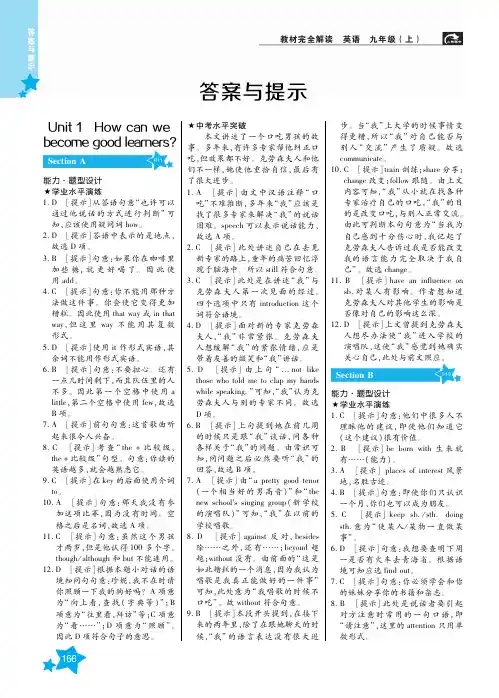
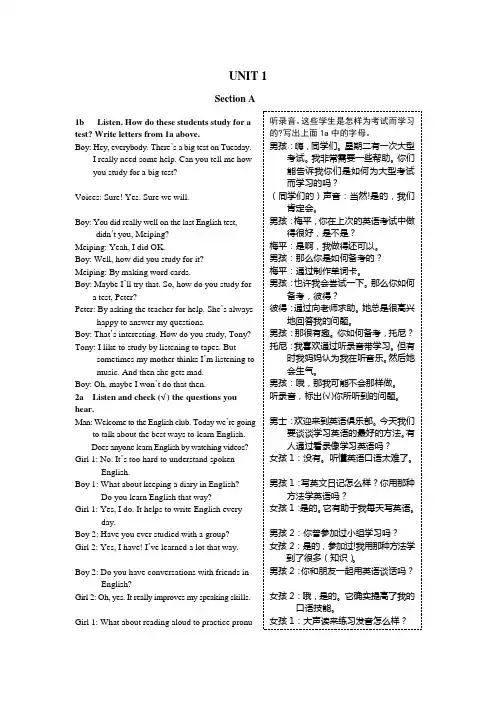
UNIT 1 Section A1b Listen. How do these students study for a test? Write letters from 1a above.Boy: Hey, everybody. There’s a big test on Tuesday.I really need some help. Can you tell me howyou study for a big test?Voices: Sure! Yes. Sure we will.Boy: You did really well on the last English test, didn’t you, Meiping?Meiping: Yeah, I did OK.Boy: Well, how did you study for it?Meiping: By making word cards.Boy: Maybe I’ll try that. So, how do you study fora test, Peter?Peter: By asking the teacher for help. She’s always happy to answer my questions.Boy: That’s interesting. How do you study, Tony? Tony: I like to study by listening to tapes. But sometimes my mother thinks I’m listening tomusic. And then she gets mad.Boy: Oh, maybe I won’t do that then.2a Listen and check (√) the questions you hear.Man: Welcome to the English club. Today we’re going to talk about the best ways to learn English.Does anyone learn English by watching videos? Girl 1: No. It’s too hard to understand spokenEnglish.Boy 1: What about keeping a diary in English?Do you learn English that way?Girl 1: Yes, I do. It helps to write English every day.Boy 2: Have you ever studied with a group?Girl 2: Yes, I have! I’ve learned a lot that way.Boy 2: Do you have conversations with friends in English?Girl 2: Oh, yes. It really improves my speaking skills. Girl 1: What about reading aloud to practice pronu- 听录音。
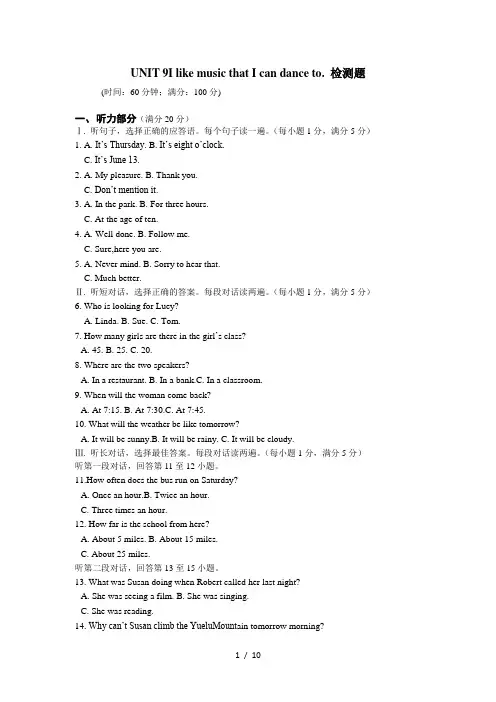
UNIT 9I like music that I can dance to. 检测题(时间:60分钟;满分:100分)一、听力部分(满分20分)Ⅰ. 听句子,选择正确的应答语。
每个句子读一遍。
(每小题1分,满分5分)1. A. It’s Thursday. B. It’s eight o’clock.C. It’s June 13.2. A. My pleasure. B. Thank you.C. Don’t mention it.3. A. In the park. B. For three hours.C. At the age of ten.4. A. Well done. B. Follow me.C. Sure,here you are.5. A. Never mind. B. Sorry to hear that.C. Much better.Ⅱ. 听短对话,选择正确的答案。
每段对话读两遍。
(每小题1分,满分5分)6. Who is looking for Lucy?A. Linda.B. Sue.C. Tom.7. How many girls are there in the girl’s class?A. 45.B. 25.C. 20.8. Where are the two speakers?A. In a restaurant.B. In a bank.C. In a classroom.9. When will the woman come back?A. At 7:15.B. At 7:30.C. At 7:45.10. What will the weather be like tomorrow?A. It will be sunny.B. It will be rainy.C. It will be cloudy.Ⅲ. 听长对话,选择最佳答案。
每段对话读两遍。
(每小题1分,满分5分)听第一段对话,回答第11至12小题。
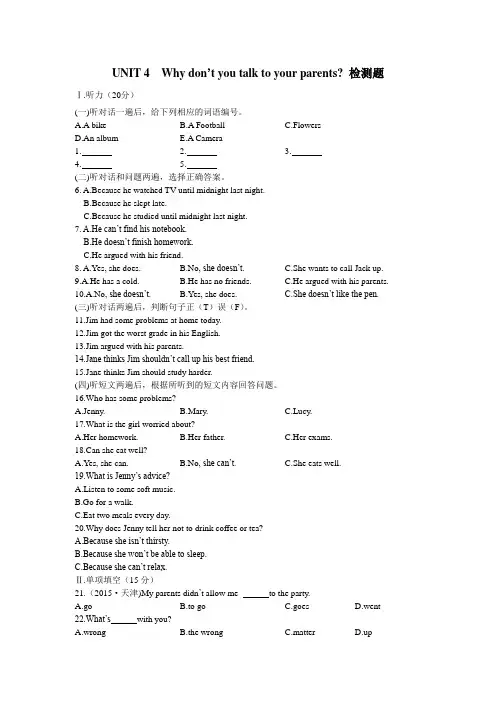
UNIT 4 Why don’t you talk to your parents? 检测题Ⅰ.听力(20分)(一)听对话一遍后,给下列相应的词语编号。
A.A bikeB.A FootballC.FlowersD.An albumE.A Camera1. 2. 3.4. 5.(二)听对话和问题两遍,选择正确答案。
6. A.Because he watched TV until midnight last night.B.Because he slept late.C.Because he studied until midnight last night.7. A.He can’t find his notebook.B.He doesn’t finish homework.C.He argued with his friend.8. A.Yes, she does. B.No, she doesn’t. C.She wants to call Jack up.9.A.He has a cold. B.He has no friends. C.He argued with his parents.10.A.No, she doesn’t. B.Yes, she does. C.She doesn’t like the pen.(三)听对话两遍后,判断句子正(T)误(F)。
11.Jim had some problems at home today.12.Jim got the worst grade in his English.13.Jim argued with his parents.14.Jane thinks Jim shouldn’t call up his best friend.15.Jane thinks Jim should study harder.(四)听短文两遍后,根据所听到的短文内容回答问题。
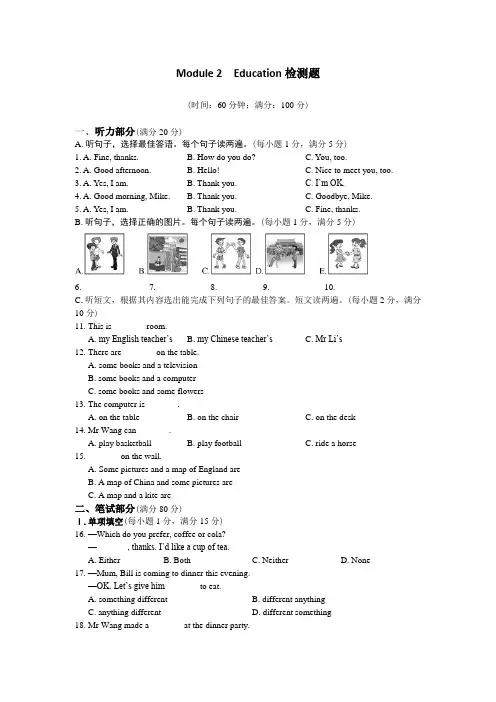
Module 2Education检测题(时间:60分钟;满分:100分)一、听力部分(满分20分)A.听句子,选择最佳答语。
每个句子读两遍。
(每小题1分,满分5分)1. A. Fine, thanks. B. How do you do? C. You, too.2. A. Good afternoon. B. Hello! C. Nice to meet you, too.3. A. Yes, I am. B. Thank you. C. I’m OK.4. A. Good morning, Mike. B. Thank you. C. Goodbye, Mike.5. A. Yes, I am. B. Thank you. C. Fine, thanks.B.听句子,选择正确的图片。
每个句子读两遍。
(每小题1分,满分5分)6. _______7. _______8. _______9. _______ 10. _______C.听短文,根据其内容选出能完成下列句子的最佳答案。
短文读两遍。
(每小题2分,满分10分)11. This is _______ room.A. my English teacher’sB. my Chinese teacher’sC. Mr Li’s12. There are _______ on the table.A. some books and a televisionB. some books and a computerC. some books and some flowers13. The computer is _______.A. on the tableB. on the chairC. on the desk14. Mr Wang can _______.A. play basketballB. play footballC. ride a horse15. _______on the wall.A. Some pictures and a map of England areB. A map of China and some pictures areC. A map and a kite are二、笔试部分(满分80分)Ⅰ.单项填空(每小题1分,满分15分)16. —Which do you prefer, coffee or cola?—_______, thanks. I’d like a cup of tea.A. EitherB. BothC. NeitherD. None17. —Mum, Bill is coming to dinner this evening.—OK. Let’s give him _______ to eat.A. something differentB. different anythingC. anything differentD. different something18. Mr Wang made a _______ at the dinner party.A. sayB. speakC. speechD. talked19. Usually the students have _______ holiday in summer.A. a 8-weekB. a 8-weeksC. an 8-weekD. an 8-weeks20. Please give me _______ about the train to Hong Kong.A. a few informationsB. a little informationsC. a few informationD. a little information21. You don’t look so _______ as usual. Why not go to see a doctor?A. wellB. betterC. badlyD. worse22. Jim spent five years _______ English before he went to Canada to study.A. learnedB. to learnC. learningD. learns23. We have learned _______ three hundred new words this term.A. at onceB. at allC. at timesD. at least24. She could speak _______ Japanese _______ Chinese, so I had to talk with her in English.A. not only; but alsoB. both; andC. neither; norD. either; or25. _______ is watching TV. Turn it off, will you?A. NobodyB. SomebodyC. AnybodyD. Everybody26. —Who taught _______ English?—Nobody. I learned all by _______.A. you; myB. your; myselfC. you; myselfD. your; my27. The child will climb the hill if it _______ tomorrow.A. won’t rainB. didn’t rainC. doesn’t rainD. isn’t raining28. None of the shoes in the shop fit me well. They are _______ too big _______ too small.A. both; andB. either; orC. neither; norD. not only; but also29. The book is _______. I wrote _______ name on its cover _______.A. my; my; myselfB. mine; my; myselfC. mine; myself; myD. myself; mine; my30. —Got any information about High School Examination?—Well, I was trying to, but found _______.A. oneB. no oneC. noneD. someⅡ.完形填空(每小题1分,满分10分)Several days ago, some students from the US visited our school. When we talked, I discovered 31 differences in school life between the US and China. For example, each class 32 fifty minutes in the US. It is a little 33 than that in China. We usually have forty or forty-five minutes in each class. Another difference is that they have less break time between 34 . Besides, although most schools in both countries finish their 35 classes at 12 o’clock, the students in the US only have an hour-long break, so they 36 eat lunch quickly. Their afternoon classes begin at 1:00 pm and school is over 37 3:00 pm. Then they take part in club activities or play sports.Many Chinese students don’t work during their high school years, while the US students like to find a part-time job in 38 free time. They don’t have a dream job in mind. They think 39 is no difference between jobs. Working is a useful experience for them and they can make money at the same time. Some of them even take one-year full-time jobs 40 they leave high school and then go to college.31. A. no B. few C. little D. some32. A. lasts B. finishes C. starts D. stays33. A. shorter B. longer C. earlier D. later34. A. schools B. classes C. meals D. students35. A. day B. night C. morning D. afternoon36. A. can’t B. mustn’t C. need to D. are able to37. A. in B. for C. during D. around38. A. my B. his C. their D. your39. A. it B. there C. that D. this40. A. after B. with C. while D. duringⅢ.阅读理解(每小题2分,满分20分)AIn Singapore, many middle school students spend a lot of their time on their studies. Good education is often regarded as a ticket to success in their future. So many of these students try their best to get good marks in their examinations. They have a lot of homework every day and exams are a big headache. Sometimes some of them are even made to go to remedial(补习的)classes after school.Schools run programmes outside school hours. The students can take part in sports and games, music and dance, hiking and rock-climbing, etc. They are also very active in community service(社区服务).In their spare time, most students like to listen to pop music. Hollywood blockbusters(大片), and Hong Kong and Singapore movies are very popular among them. They understand IT very well. Some of them also spend their free time surfing the Internet, e-mailing their friends, and playing computer and video games.They sometimes go to cafes, fast-food restaurants, shopping centers and big bookstores.So, it looks like life as a middle school student in Singapore is not easy but it is rich and colorful.41. What is NOT mentioned in the passage?A. Schoolwork.B. After-class activities.C. Subjects.D. Things to do in the spare time.42. Why do students work hard at school in Singapore?A. Because they have a lot of homework.B. Because they have to go to remedial classes.C. Because they want to get a good future.D. Because they have many outside school activities.43. What does the underlined sentence mean in the first paragraph?A. Maybe some students are afraid of exams and have difficulty getting good marks.B. Students have a headache before an exam.C. Students have few exams.D. Students are in poor health because of exams.44. Programmes outside school hours are _______.A. the same as spare time activitiesB. remedial classes after schoolC. sports activitiesD. popular among students45. What do you know from the last sentence?A. The middle school students live an easy life in Singapore.B. The middle school students’ life in Singapore is amazing.C. The middle school s tudents’ life in Singapore is boring.D. The middle school students’ life in Singapore is hard, but interesting.BWe spend hours, days and years of our lives in education. But how perfect do you think your school is? Imagine you could design(设计) your ideal(理想的) school. What would it be like? We wanted to find out what teenagers around the world thought. Here is some designing from four46. Ma thinks his dream school should provide _______ for students.A. more enjoyable thingsB. a comfortable computer roomC. a place to switch off from the lessons47. Sonia thinks students should share a room where they can _______.A. play sportsB. play instrumentsC. play computer games48. Richard wants to have _______ off every week.A. two daysB. three daysC. four days49. Rebecca may like _______ according to the passage.A. playing musicB. chatting with friendsC. doing some shopping50. We can infer(推断)that in the four children’s opinion, the ideal school should be a placewhere _______.A. students can learn more knowledgeB. students can get on well with their teachersC. students’ wishes and interests can be respectedⅣ.补全对话(每小题2分,满分10分)(Da Wei comes across Li Lei, who is studying, in the school library.)A: Hi, Li Lei. Are you busy with your homework now?B: Oh, yeah, Da Wei. And you?A: I’m here for a book. Hey, Li Lei. Have a break! We should be outside in the fresh air. It’s good for us.B: Sorry, I can’t. 51 I must hand it in tomorrow.A: Oh, I see. But we can’t always stay indoors. We must often take exer cise. 52B: Never. I hardly have time now. A sea of homework almost takes up all my free time. It’s sad but that’s life.53A: You mean my life? In fact, I’m also very busy like you. But you know I like sports. 54 Whenever I have a little time, I will try them.B: No wonder you are so energetic.A: Yeah, better health, better grades. 55B: Yes, you are right. It sounds as if I should also try to exercise often in the future. Da Wei, shall we play basketball for a while now?A: OK. Let’s go!Ⅴ.完成句子(每小题2分,满分10分)根据所给中文意思完成句子,每空限填一词。
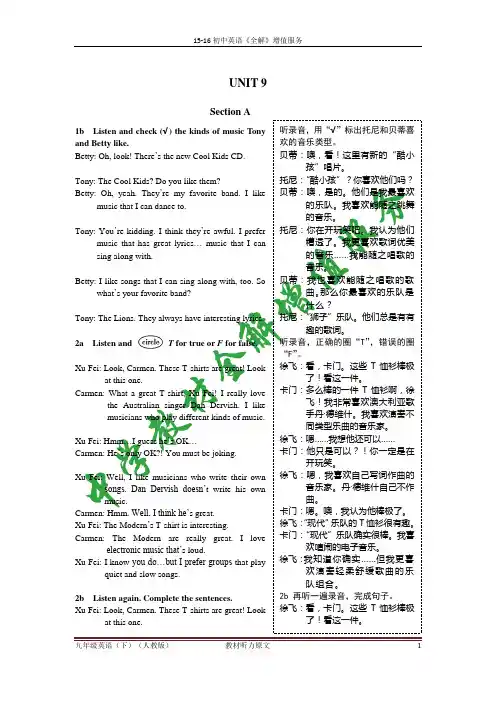
UNIT 9
Section A
2a Listen and T for true or F for false. Xu Fei: Look, Carmen. These T-shirts are great! Look
movie, but it was so sad that it made us cry.
John: Sad movies don ’t make me cry. They just make
me want to leave!
Tina: You sound just like my brother!
Section B
它是一部非常好的电影,但它很伤感,使我们哭了。
约翰:悲伤的电影不会使我哭泣。
它们只会使我想离开! 蒂娜:你听起来就像我的哥哥!
UNIT 13 Section A
Section A
1b Listen and match the memory with the person.
Mary: Hey, Frank! Peter, Sarah and I were just sharing memories of junior high school. Frank: Great! Do you have any special memories, Mary?
Mary: Oh yeah, lots…I remember losing my schoolbag in Grade 7. 听录音,将记忆与人物相匹配。
玛丽:嗨,弗兰克!彼得、萨拉和我正在分享初中的一些记忆。
弗兰克:太棒了!你有一些特别的
记忆吗,玛丽?
玛丽:哦,是的,很多……我记得在七年级时我丢了我的书包。
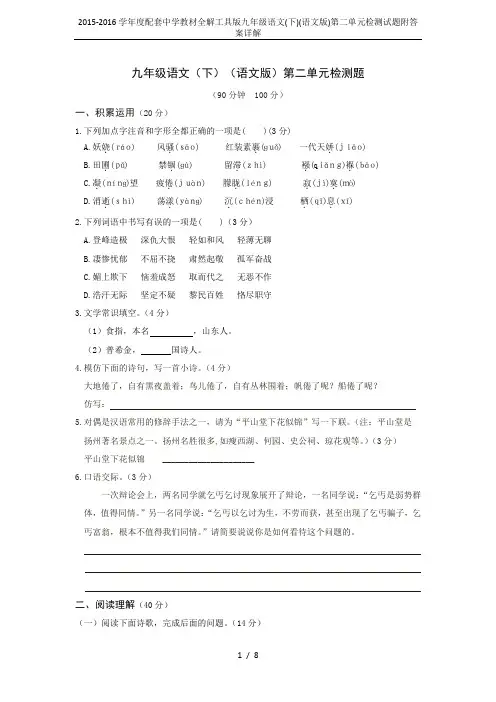
九年级语文(下)(语文版)第二单元检测题(90分钟 100分)一、积累运用(20分)1.下列加点字注音和字形全都正确的一项是( )(3分)A.妖娆.(ráo) 风骚.(sāo) 红装素裹.(ɡuǒ) 一代天娇.(jiāo)B.田圃.(pǔ) 禁锢.(ɡù) 留滞.(zhì) 襁.(qiǎng)褓.(bāo)C.凝.(nínɡ)望疲倦.(juàn) 朦胧.(léng) 寂.(jì)寞.(mò)D.消逝.(shì) 荡漾.(yànɡ) 沉.(chén)浸栖.(qī)息.(xī)2.下列词语中书写有误的一项是( )(3分)A.登峰造极深仇大恨轻如和风轻薄无聊B.凄惨忧郁不屈不挠肃然起敬孤军奋战C.媚上欺下恼羞成怒取而代之无恶不作D.浩汗无际坚定不疑黎民百姓恪尽职守3.文学常识填空。
(4分)(1)食指,本名,山东人。
(2)普希金,国诗人。
4.模仿下面的诗句,写一首小诗。
(4分)大地倦了,自有黑夜盖着;鸟儿倦了,自有丛林围着;帆倦了呢?船倦了呢?仿写:5.对偶是汉语常用的修辞手法之一,请为“平山堂下花似锦”写一下联。
(注:平山堂是扬州著名景点之一。
扬州名胜很多,如瘦西湖、何园、史公祠、琼花观等。
)(3分)平山堂下花似锦 _____________________6.口语交际。
(3分)一次辩论会上,两名同学就乞丐乞讨现象展开了辩论,一名同学说:“乞丐是弱势群体,值得同情。
”另一名同学说:“乞丐以乞讨为生,不劳而获,甚至出现了乞丐骗子,乞丐富翁,根本不值得我们同情。
”请简要说说你是如何看待这个问题的。
二、阅读理解(40分)(一)阅读下面诗歌,完成后面的问题。
(14分)假如生活欺骗了你普希金假如生活欺骗了你,不要悲伤,不要心急!忧郁的日子须要镇静:相信吧,快乐的日子将会来临。
心儿永远向往着未来,现在却常是忧郁:一切都是瞬息,一切都将会过去;而那过去了的,就会成为亲切的怀恋。
UNIT 10 You’re supposed to shake hands. 检测题(时间:60分钟;满分:100分)一、 听力部分(满分20分)分) Ⅰ. 听句子,选择正确的应答语。
每个句子读一遍。
(每小题1分,满分5分)分)1. A. Winter. B. Chinese. C. Sunday.2. A. It‟s bad. B. Thank you.C. You‟re welcom C. You‟re welcome. e. 3. A. It‟s dry. B. It‟s exciting. C. It‟s expensive.4. A. Go ahead. B. Sorry, he‟s not in. C. This is Jane speaking.5. A. You‟re right. B. Well done. C. Good idea.Ⅱ. 听短对话,选择正确的答案。
每段对话读两遍。
(每小题1分,满分5分)分)6. Where are they talking?A. At home.B. At a shop.C. At a restaurant. 7. What is the girl doing?A. Taking pictures.B. Choosing a gift.C. Talking with her father. 8.What is Jim going to do during the summer holiday? A. Read. B. See movies. C. Do a part-time job.9. How long does Tom usually stay in the library every day? A. One hour. B. Two hours. C. Three hours.10. When will the concert start? A. At half past six.B. At half past seven.C. In thirty minutes. Ⅲ. 听长对话,选择最佳答案。
Module 4 Rules and suggestions检测题(时间:60分钟;满分:100分)一、听力部分(满分20分)A.听句子,选出与所听句子内容相匹配的图画。
每个句子读两遍。
(每小题1分,满分5分)1. A. B. C.2. A. B. C.3. A. B. C.4. A. B. C.5. A. B. C.B.将听到五段对话,每段对话后有一个小题。
请在每小题所给的A、B、C三个选项中选出一个最佳选项。
每段对话读两遍。
(每小题1分,满分5分)6. Where are they going to eat their lunch?A. In the park.B. In the restaurant.C. In the office.7. Why does Mary look so happy?A. Because today is her birthday.B. Because she’s won first prize.C. Because she’s passed the exam.8. What did Sam do last Sunday?A. Went to the town.B. Visited his dad.C. Cleaned the yard.9. Where does the conversation probably take place?A. In a library.B. In a post office.C. In a bank.10. What does the man mean?A. He likes going for a picnic in autumn.B. He won’t go for a picnic in bad weather.C. He wants to go for a picnic with the woman.C.听独白,从A、B、C三个选项中选择符合独白内容的选项,回答问题。
MODULE 7 English for you and me 检测题(时间:60分钟;满分:100分)一、听力部分(满分15分)Ⅰ.根据你所听到的句子,选出最恰当的应答句。
每个句子读一遍。
(每小题1分,满分5分)1. A. All right. B. I don‟t think so. C. That‟s all right.2. A. Certainty, the sooner the better. B. All right.C. Don‟t worry about it.3. A. Yes, I want the big one. B. No, I don‟t. C. Either will do.4. A. Sure, here you are. B. All right. C. That‟s very kind of you.5. A. You are welcome. B. How nice! C. How are you!Ⅱ.根据你所听到的对话和问题,选择正确的答案。
对话和问题读两遍。
(每小题1分,满分5分)6. A. In the office. B. In the restaurant. C. At home.7. A. Yes, because he has lots of money.B. No, because he has not enough money.C. Yes, if he borrows money from the woman.8. A. At 5:30. B. At 6:30. C. At 6:00.9. A. Yes, she will. B. No, she won‟t.C. No, because she wants to do her homework at home.10. A. At the library. B. At the cinema. C. In a shop.Ⅲ.听短文,选择最佳答案。
UNIT 4 I used to be afraid of the dark.检测题(时间:60分钟,满分:100分)一、听力部分(20分)(一)听句子,选择正确的应答语。
每个句子读一遍。
1.A.She is a nice girl. B. I’m sorry to hear that. C. What a pity!2.A.Who are you? B. I’m John. C. This is John speaking.3.A.Good luck! B. No, it isn’t. C. It’s rainy.4.A.I am sorry. B.OK, I will. C.I don’t.5.A.Red roses. B .Sounds good. C.I like white.(二)听短对话,选择正确的答案。
每段对话读两遍。
6.What did the boy’s mother use to look like?A. She was thin.B. She was tall.C. She had long hair.7.What did Bill use to look like?A. He liked apples.B. He used to be short.C. He wasn’t short.8.Is the boy still afraid of snakes?A. Yes, he is.B. Yes, he did.C. No, he isn’t.9.Which team did Steve use to be on?A. The swimming team.B. The soccer team.C.The tennis team.10.How did Bob use to go to school?A. He used to walk.B. He used to ride a bike.C. He used to take a bus.(三)听长对话,选择最佳答案。
Module 3 Life now and then检测题(时间:60分钟;满分:100分)一、听力部分(满分20分)A.听句子,选出句子中所包含的信息。
每个句子读一遍。
(每小题1分,满分5分)1. A. fine B. five C. four2. A. up B. us C. one3. A. one B. two C. three4. A. Jenny lives in China. B. I live in Canada. C. My name is Jenny.5. A. My father has long arms.B. My father’s fingers are long.C. My father’s legs are long.B.听对话和问题,选择正确答案。
每段对话读两遍。
(每小题1分,满分5分)6. A. White. B. Yellow. C. Blue.7. A. It happened in a clothing shop.B. It happened in a hospital.C. It happened at school.8. A. Mr Black is free. B. Mr Black is out. C. Mr Black is busy.9. A. Wednesday. B. Tuesday. C. Monday.10. A. Because he didn’t want to go to the party.B. Because he had some other things to do.C. Because he was ill and couldn’t go to the party.C.听对话和问题,选择正确答案。
对话读两遍。
(每小题2分,满分10分)11. Where is the woman?A. She’s in a shoe shop.B. She’s in a toy shop.C. She’s in a bookshop.12. What’s she looking for?A. She’s looking for a bear.B. She’s looking for a toy car.C. She’s looking for a toy bear.13. How much is the gray teddy bear?A. 200 yuan.B. 100 yuan.C. 80 yuan.14. Why doesn’t the woman buy the first teddy bear?A. It’s too small.B. She doesn’t like the color.C. It’s too big.15. How much does the woman pay for the teddy bear in the end?A. 80 yuan.B. 200 yuan.C. 100 yuan.二、笔试部分(满分80分)Ⅰ.根据句意及首字母或汉语提示完成句子(每小题0.5分,满分5分)16. The Chinese Character Dictation Contest reminds us that Chinese characters play an important_______(角色) in passing on Chinese language and culture.17. He used to be very poor, but now he is very w .18. In my _______(空余的) time, I like reading novels.19. _______(教育) is really important in our lives, so we should work hard at school.20. A teacher is often compared to a c .21. The poor boy was born _______(聋的), and he can hear nothing.22. Don’t stand outside in the c . The temperature is very low.23. The duty of a p to deliver letters and parcels.24. They s watch television these days because they have a lot of work to do.25. His eyes showed no _______(害怕).Ⅱ.根据汉语意思完成句子(每小题1分,满分5分)26.我们擅长预防疾病。
We’re _______ _______ _______ illness.27.我正在想问题。
I’m _______ _______ a problem.28.他们已经结婚20年了。
They _______ _______ _______ for twenty years.29.我们不再年轻了。
We are _______ _______ young.30.他找到了学习英语的新方法。
He _______ _______ a new way of _______ English.Ⅲ.句型转换(每小题1分,满分5分)31. He is good at physics, and he can work out the problem. (改为同义句)He _______ _______ in physics, and he can work out the problem.32. She is very kind and always helps me to learn English. (改为同义句)She is very kind and always _______ _______ _______ my English.33. The box is so heavy that I can’t carry it. (合并成一个简单句)The box is _______ heavy _______ me _______ carry.34. My sister is as thin as me. (改为否定句)My sister _______ _______ _______ _______ me.35. Tom is very strong. He can lift the heavy box. (改为同义句)Tom is _______ _______ _______ _______ the heavy box.Ⅳ.单项填空(每小题1分,满分15分)36. My problem right now is ________ I should ask for another computer.A. ifB. whetherC. whichD. what37. —Have you ________ your ticket, sir?—No, I’m still ________ it.A. found; findingB. looked for; looking forC. found; looking forD. looked for; finding38. I _______ go to the movies. The tickets are too expensive for me.A. alwaysB. oftenC. some timesD. seldom39. Uncle Wang gave all his savings to the Project Hope ________ he was not rich.A. becauseB. as ifC. thoughD. or40. —________ going hiking this weekend?—Sorry. I prefer staying at home to going out.A. WhatB. HowC. How aboutD. Why41. Health is very important to us. We should eat more vegetables and fruit instead of ________rich food.A. too muchB. much tooC. too manyD. many too42. She looks ________ because she has a ________ vacation.A. relaxed; relaxedB. relaxed; relaxingC. relaxing; relaxingD. relaxing; relaxed43. —Mum, could I have a computer like this?—Certainly, we can buy ________ one, but as good as this. The price of this kind is a little higher.A. a cheapB. a cheaperC. a smallD. a smaller44. They ________ for over ten years.A. are marryingB. have been marriedC. will marryD. marry45. —Can you hear me?—No, I can’t. Would you please speak ________?A. clearly enoughB. clear enoughC. enough clearD. enough clearly46. His father often helps him ________ his maths.A. ofB. toC. onD. with47. Computers can work ________ than men and make ________ mistakes.A. slower; lessB. faster; fewerC. faster; lessD. faster; more48. My aunt _______ drive her car to the factory, but now she _______ going there by bus.A. used to; used toB. is used to; is used toC. used to; is used toD. is used to; used to49. —What do you like ________, tea, coffee or milk?—Tea, of course.A. betterB. goodC. wellD. best50. ________ exercise you take, ________ you will feel.A. Much; healthyB. The more; the healthierC. More; healthierD. The more; healthierⅤ.完形填空(每小题1分,满分10分)Each one of us is supposed to save the environment.Hundreds of years ago, life was 51 than 52 today. People didn’t use m odern machines, and there 53 modern machines, 54 .Life today 55 new problems. One of the biggest is pollution. Water pollution has 56 our rivers and lakes dirty. It kills our fish and affects our drinking water. Noise pollution makes us 57 louder and 58 . Air pollution is the most serious kind of pollution. It affects 59 living thing in the world.Cars, planes and factories all pollute our air every day. Sometimes the pollution is so 60 that it is like a quilt over a city. This kind of quilt is called smog(烟雾).51. A. more hard B. more harder C. much harder D. much more harder52. A. they B. they were C. it was D. it is53. A. was not B. were no C. were D. was54. A. either B. too C. also D. neither55. A. bring B. have C. have got D. has brought56. A. made B. let C. taken D. changed57. A. say B. talk C. tell D. spoke58. A. feel happy more quickly B. get angry much easierC. become angry more easilyD. feel sad more slowly59. A. most B. all C. one D. every60. A. thin B. bad C. hard D. lightⅥ.阅读理解(每小题2分,满分20分)AWhat will you do when you have something difficult to do? I used to ask my mother for help. But she always said, “Do it yourself, dear.” I was not glad at all. I thought she was the laziest mother in the world!For example, one day, I decided to invite some friends to my home. My bedroom was not in order. Books were everywhere. And I didn’t make the bed. I asked my mother to help me to clean it, but she still said, “Do it yourself, girl.”Because of my “lazy mother”, I have to wash my clothes and clean my room. I have to help my parents do some housework. I even have to go to the dentist by myself. It is really hard for me to do everything well, but I have learned a lot.As time goes by, I come to understand my mother. She makes me clever and active! What a great mother! A good mother is worth(值……) one hundred teachers! Don’t you think so?61. The writer used to ________ when she had something difficult to do.A. give upB. be helped by her momC. ask her mom for helpD. ask her friends to help her62. What does the underlined phrase “in order” mean in Chinese?A.不整洁的B.订购中C.正常的D.出故障的63. What would the mother NOT say when the writer asked her for help?A. Do it yourself, girl.B. Do it yourself, dear.C. Let me help you, dear.D. God helps those who help themselves, girl.64. The writer has learned a lot by ________.A. asking her mom for helpB. doing everything by herselfC. talking with her mother oftenD. inviting her friends to her house65. What does the writer think of her mother?A. She is a lazy mother.B. She is an active mother.C. She is always doing things for her.D. She is a clever and great mother.BAre you looking for something fun and would you like to help others in your spare time? Then join us to be a volunteer! We’re a non-profit organization. We have volunteer jobs of all ages. Anyone, from twelve-year-old children to people in their seventies, can become a volunteer.You can help people in many ways. Schools need help with taking care of children while parents are working. Hospitals need volunteers to look after children while their parents are seeing a doctor. Animal lovers can help take care of those dogs and cats without homes. There is something for everyone.“As a volunteer, I don’t want to get anything. Seeing the children’s happy faces, I’m happy, too,” said Carlos Domingo, an old woman of 62. “I often played computer games in my spare time before. Now I help older people learn how to use computers,” said another volunteer at the age of 18.If everyone helps out a bit, we’ll have a better world to live in. Interested? Call us 1 800 555 5756 or visit our website: .66. When do the volunteers help others?A. In their spare time.B. At weekends.C. On weekdays.D. In the evenings.67. ________ can be a volunteer.A. ChildrenB. Old womenC. Anyone aged from 12 to 70D. Young people68. V olunteers want to get ________ when they help others.A. moneyB. computersC. everythingD. nothing69. Carlos Domingo does volunteer work with ________.A. animalsB. childrenC. computersD. older people70. We can read such a passage ________.A. in a newspaperB. in a storybookC. in a picture bookD. in a textbookⅦ.书面表达(满分20分)随着全球环境的恶化,越来越多的人选择过低碳生活。